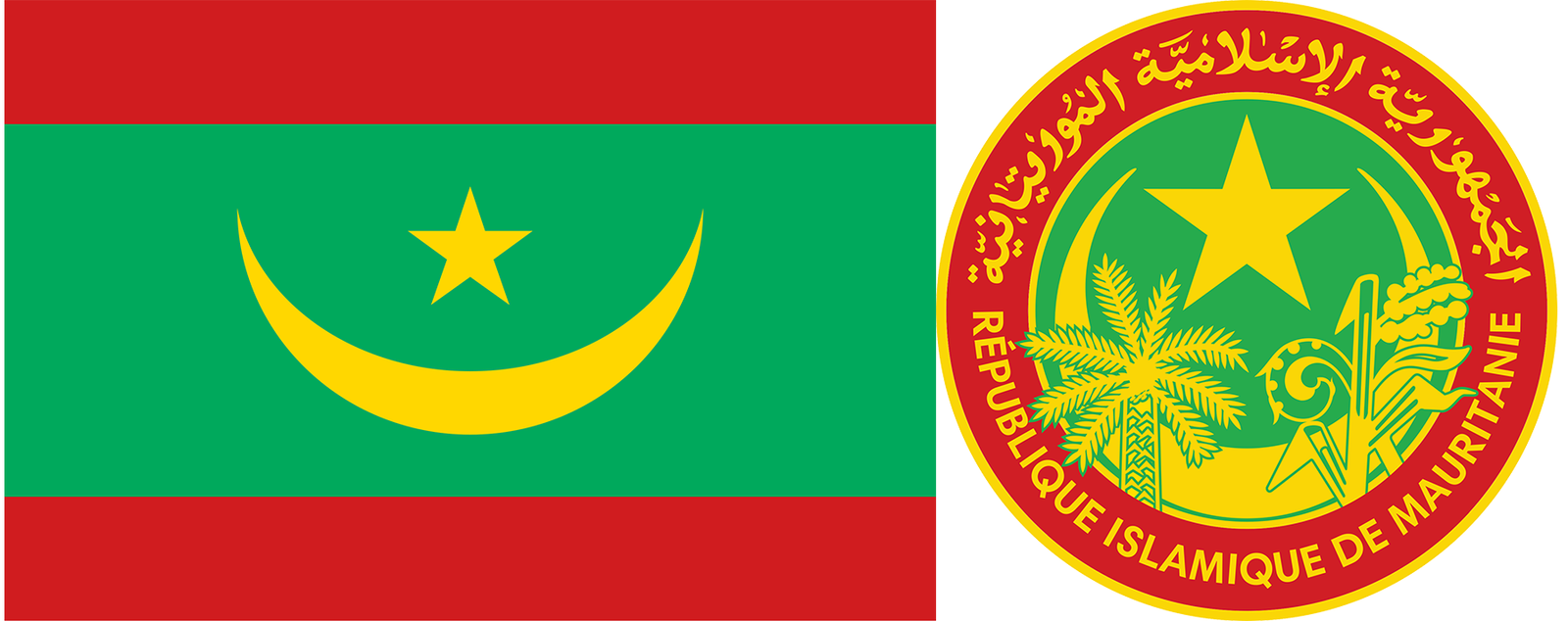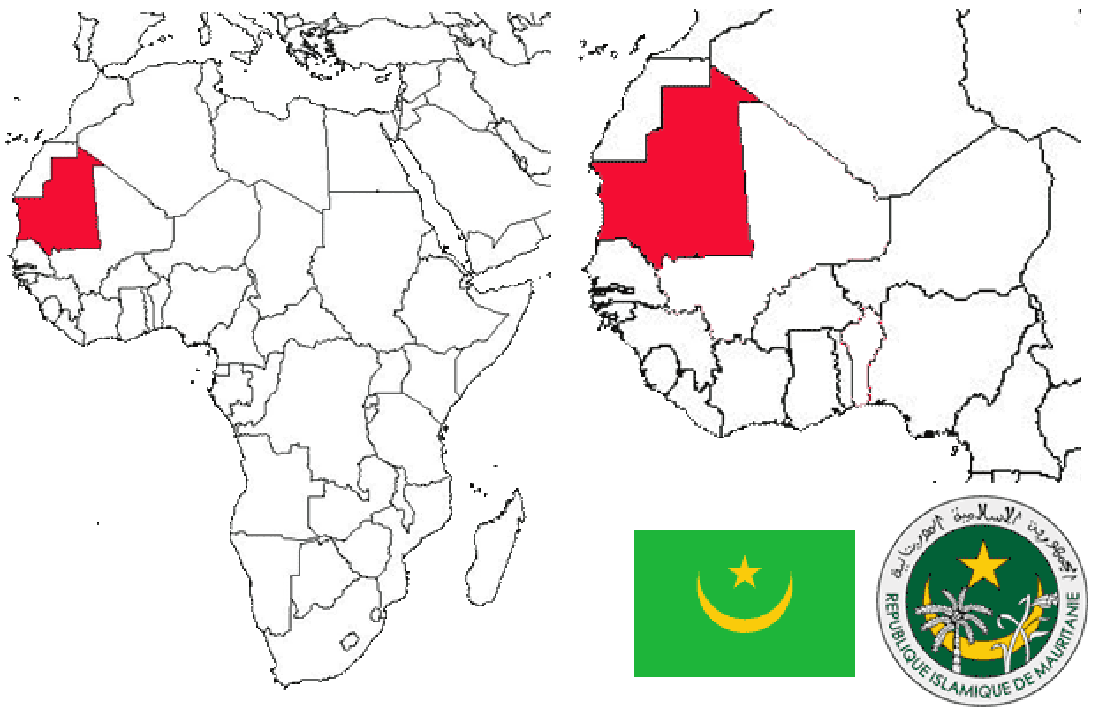FabulousFusionFood's Mauritanian Recipes Home Page
 The flag of Mauritania (left) and the coat of arms of Mauritania (right).
The flag of Mauritania (left) and the coat of arms of Mauritania (right).
Welcome to the summary page for FabulousFusionFood's Mauritania recipes, part of North Africa. This page provides links to all the Mauritanian recipes presented on this site, with 19 recipes in total.
These recipes, for the major part, originate in Mauritania. Otherwise they are fusion recipes with major Mauritanian influences.
Mauritania, officially the Islamic Republic of Mauritania, (الجمهورية الإسلامية الموريتانية [al-Jumhūrīyah al-Islāmīyah al-Mūrītānīyah]) is a sovereign country in Northwest Africa. It is bordered by the Atlantic Ocean to the west, Western Sahara to the north and northwest, Algeria to the northeast, Mali to the east and southeast, and Senegal to the southwest. By land area Mauritania is the 11th-largest country in Africa and 28th-largest in the world; 90% of its territory is in the Sahara. Most of its population of some 4.3 million lives in the temperate south of the country, with roughly a third concentrated in the capital and largest city, Nouakchott, on the Atlantic coast.
 The image above shows a view of Mauritania (in red) in relation to Africa (left) and West Africa (right) with the flag and coat of arms inset.The country's name derives from the ancient Berber kingdom of Mauretania in North Africa within the ancient Maghreb. Berbers occupied what is now Mauritania beginning in the third century AD. Arabs under the Umayyad Caliphate conquered the area in the late seventh century, bringing Islam, Arab culture, and the Arabic language. In the early 20th century, Mauritania was colonized by France as part of French West Africa. It achieved independence in 1960, but has since experienced recurrent coups and periods of military dictatorship.
The image above shows a view of Mauritania (in red) in relation to Africa (left) and West Africa (right) with the flag and coat of arms inset.The country's name derives from the ancient Berber kingdom of Mauretania in North Africa within the ancient Maghreb. Berbers occupied what is now Mauritania beginning in the third century AD. Arabs under the Umayyad Caliphate conquered the area in the late seventh century, bringing Islam, Arab culture, and the Arabic language. In the early 20th century, Mauritania was colonized by France as part of French West Africa. It achieved independence in 1960, but has since experienced recurrent coups and periods of military dictatorship.
Mauritania is culturally and politically part of the Arab world; it is a member of the Arab League and Arabic is the official language. The official religion is Islam, and almost all inhabitants are Sunni Muslims. Despite its prevailing Arab identity, Mauritanian society is multiethnic; the Bidhan, or so-called 'white moors', make up 30% of the population, while the Haratin, or so-called 'black moors', comprise 40%. Both groups reflect a fusion of Arab-Berber ethnicity, language, and culture. The remaining 30% of the population comprises various sub-Saharan ethnic groups.
The Umayyads were the first Arab Muslims to enter Mauritania. During the Islamic conquests, they made incursions into Mauritania and were present in the region by the end of the seventh century. Many Berber tribes in Mauritania fled the arrival of the Arabs to the Gao region in Mali.
Other peoples also migrated south past the Sahara and into West Africa. In the 11th century, several nomadic Berber confederations in the desert regions overlapping present-day Mauritania joined together to form the Almoravid movement. They expanded north and south, spawning an important empire that stretched from the Sahara to the Iberian Peninsula in Europe. According to a disputed Arab tradition the Almoravids traveled south and conquered the ancient and extensive Ghana Empire around 1076.
From 1644 to 1674 the indigenous peoples of the area that is modern Mauritania made what became their final effort to repel the Yemeni Maqil Arabs who were invading their territory. This effort, which was unsuccessful, is known as the Char Bouba War. The invaders were led by the Beni Hassan tribe. The descendants of the Beni Hassan warriors became the upper stratum of Moorish society. Hassaniya, a bedouin Arabic dialect named for the Beni Hassan, became the dominant language among the largely nomadic population.
Starting in the late 19th century, France laid claim to the territories of present-day Mauritania, from the Senegal River area northwards. In 1901, Xavier Coppolani took charge of the imperial mission. French rule brought legal prohibitions against slavery and an end to interclan warfare. During the colonial period 90% of the population remained nomadic. Gradually many individuals belonging to sedentary peoples, whose ancestors had been expelled centuries earlier, began to migrate into Mauritania. Until 1902, the capital of French West Africa was in modern-day Senegal. It was first established at Saint-Louis and later, from 1902 to 1960, in Dakar.
After Mauritanian independence, larger numbers of indigenous sub-Saharan African peoples (Haalpulaar, Soninke, and Wolof) migrated into it, most of them settling in the area north of the Senegal River. Many of these new arrivals had been educated in the French language and customs, and became clerks, soldiers, and administrators in the new state.
Modern-day slavery still exists in different forms in Mauritania. According to some estimates, thousands of Mauritanians are still enslaved.
French colonial influence (Mauritania was a colony until 1960) has also played a role in influencing the cuisine of the relatively isolated land.[1] Alcohol is prohibited in the Muslim faith and its sale is largely limited to hotels. Mint tea is widely consumed[1] and poured from height to create foam.[3] Traditionally, meals are eaten communally.
These recipes, for the major part, originate in Mauritania. Otherwise they are fusion recipes with major Mauritanian influences.
Mauritania, officially the Islamic Republic of Mauritania, (الجمهورية الإسلامية الموريتانية [al-Jumhūrīyah al-Islāmīyah al-Mūrītānīyah]) is a sovereign country in Northwest Africa. It is bordered by the Atlantic Ocean to the west, Western Sahara to the north and northwest, Algeria to the northeast, Mali to the east and southeast, and Senegal to the southwest. By land area Mauritania is the 11th-largest country in Africa and 28th-largest in the world; 90% of its territory is in the Sahara. Most of its population of some 4.3 million lives in the temperate south of the country, with roughly a third concentrated in the capital and largest city, Nouakchott, on the Atlantic coast.
 The image above shows a view of Mauritania (in red) in relation to Africa (left) and West Africa (right) with the flag and coat of arms inset.
The image above shows a view of Mauritania (in red) in relation to Africa (left) and West Africa (right) with the flag and coat of arms inset.Mauritania is culturally and politically part of the Arab world; it is a member of the Arab League and Arabic is the official language. The official religion is Islam, and almost all inhabitants are Sunni Muslims. Despite its prevailing Arab identity, Mauritanian society is multiethnic; the Bidhan, or so-called 'white moors', make up 30% of the population, while the Haratin, or so-called 'black moors', comprise 40%. Both groups reflect a fusion of Arab-Berber ethnicity, language, and culture. The remaining 30% of the population comprises various sub-Saharan ethnic groups.
The Umayyads were the first Arab Muslims to enter Mauritania. During the Islamic conquests, they made incursions into Mauritania and were present in the region by the end of the seventh century. Many Berber tribes in Mauritania fled the arrival of the Arabs to the Gao region in Mali.
Other peoples also migrated south past the Sahara and into West Africa. In the 11th century, several nomadic Berber confederations in the desert regions overlapping present-day Mauritania joined together to form the Almoravid movement. They expanded north and south, spawning an important empire that stretched from the Sahara to the Iberian Peninsula in Europe. According to a disputed Arab tradition the Almoravids traveled south and conquered the ancient and extensive Ghana Empire around 1076.
From 1644 to 1674 the indigenous peoples of the area that is modern Mauritania made what became their final effort to repel the Yemeni Maqil Arabs who were invading their territory. This effort, which was unsuccessful, is known as the Char Bouba War. The invaders were led by the Beni Hassan tribe. The descendants of the Beni Hassan warriors became the upper stratum of Moorish society. Hassaniya, a bedouin Arabic dialect named for the Beni Hassan, became the dominant language among the largely nomadic population.
Starting in the late 19th century, France laid claim to the territories of present-day Mauritania, from the Senegal River area northwards. In 1901, Xavier Coppolani took charge of the imperial mission. French rule brought legal prohibitions against slavery and an end to interclan warfare. During the colonial period 90% of the population remained nomadic. Gradually many individuals belonging to sedentary peoples, whose ancestors had been expelled centuries earlier, began to migrate into Mauritania. Until 1902, the capital of French West Africa was in modern-day Senegal. It was first established at Saint-Louis and later, from 1902 to 1960, in Dakar.
After Mauritanian independence, larger numbers of indigenous sub-Saharan African peoples (Haalpulaar, Soninke, and Wolof) migrated into it, most of them settling in the area north of the Senegal River. Many of these new arrivals had been educated in the French language and customs, and became clerks, soldiers, and administrators in the new state.
Modern-day slavery still exists in different forms in Mauritania. According to some estimates, thousands of Mauritanians are still enslaved.
Food and Cuisine:
The cuisine of Mauritania includes the culinary practices of Mauritania. Historically, what is now Mauritania has been influenced by Arab, Berbers and African peoples who have lived in and traversed the 'stark' landscape marked with Sahara desert dunes in caravans.[1] There is an overlap with Moroccan cuisine in the north and Senegalese cuisine in the south.French colonial influence (Mauritania was a colony until 1960) has also played a role in influencing the cuisine of the relatively isolated land.[1] Alcohol is prohibited in the Muslim faith and its sale is largely limited to hotels. Mint tea is widely consumed[1] and poured from height to create foam.[3] Traditionally, meals are eaten communally.
The alphabetical list of all the Mauritanian recipes on this site follows, (limited to 100 recipes per page). There are 19 recipes in total:
Page 1 of 1
| Al Mechoui (Spit-roasted Baby Lamb) Origin: Mauritania | Chubbagin Lélé et Raabie Origin: Mauritania | Maru we-llham (Meat and Rice with Vegetables) Origin: Mauritania |
| Al-Aïch (Chicken, Beans and Couscous) Origin: Mauritania | Harira Mauritanienne (Mauritanian Harira) Origin: Mauritania | Mechoui (Dried-fruit Stuffed Leg of Lamb) Origin: Mauritania |
| Bonava (Meat and Potatoes Stew) Origin: Mauritania | Jus de Bouye (Baobab Fruit Drink) Origin: Mauritania | Poisson Yassa Mauritanienne (Mauritanian Fish Yassa) Origin: Mauritania |
| Bonava (Mauritanian Lamb Stew) Origin: Mauritania | Lakh Mauritanienne Origin: Mauritania | Smothie à l'avocat (Avocado Smoothie) Origin: Mauritania |
| Boulgour aux Fruits Secs (Bulgur Wheat with Dried Fruit) Origin: Mauritania | Leksour (Mauritanian-style Pancakes with Sauce) Origin: Mauritania | Vermicelles (Vermicelli) Origin: Mauritania |
| Camel Chubbagin Origin: Mauritania | Leksour (Lamb Stew on Millet Pancakes) Origin: Mauritania | |
| Camel Meat Patties Origin: Mauritania | Marolaym Origin: Mauritania |
Page 1 of 1